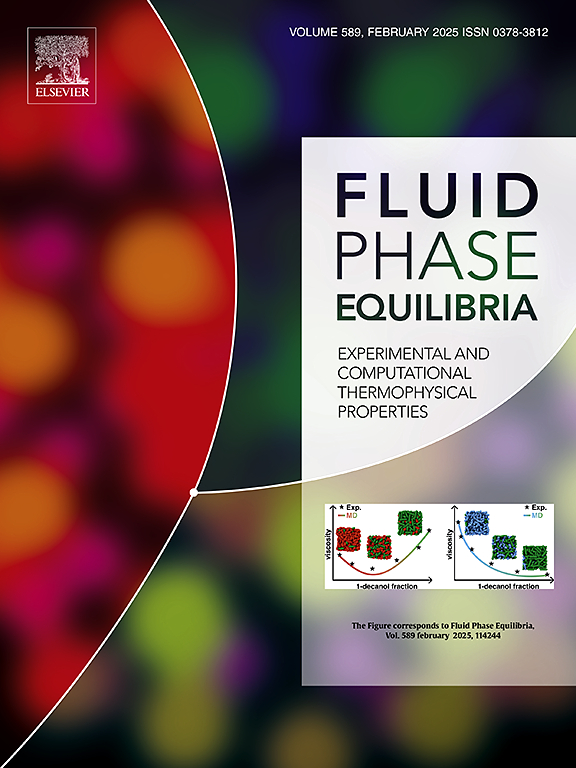A group contribution-based machine learning model to estimate the triple-point temperature
IF 2.7
3区 工程技术
Q3 CHEMISTRY, PHYSICAL
引用次数: 0
Abstract
This manuscript reports a new thermodynamic model for calculating triple-point temperature using a machine-learning algorithm and group contribution theory. The model was developed using the Auto-Machine Learning approach available in the auto-sklearn library in Python to identify the best algorithm for estimating this relevant property of pure compounds. Different input variables and ensembles of machine learning algorithms were assessed. The limitations and gaps in the proposed model are highlighted for different chemical families and functional groups. The results demonstrate that the Gradient Boosting algorithm achieved the best performance in estimating the triple-point temperature. The average absolute relative deviation of this model ranged from 0.85 to 5.73 % for the main chemical families included in the data analysis. The proposed model is reliable for calculating the triple-point temperatures of alkanes, alkynes, alcohols, cycloalkenes, polyols, nitriles, and anhydrides. However, the estimation of the triple-point temperature was challenging for polar compounds containing halogens and NO2, which showed a non-ideal thermodynamic behavior. This study represents an initial step towards the development of an improved thermodynamic framework based on machine learning algorithms and group contribution theory for the accurate estimation of triple-point temperature.
基于群体贡献的机器学习模型估计三点温度
这篇手稿报告了一个新的热力学模型计算三点温度使用机器学习算法和群体贡献理论。该模型是使用Python中的auto-sklearn库中的Auto-Machine Learning方法开发的,以确定估计纯化合物的相关属性的最佳算法。评估了不同的输入变量和机器学习算法的集合。在不同的化学家族和官能团强调了所提出的模型的局限性和差距。结果表明,梯度增强算法在三点温度估计中取得了最好的性能。该模型的平均绝对相对偏差(AARD)在0.85 ~ 5.73%之间。所提出的模型对于计算烷烃、炔、醇、环烯烃、多元醇、腈和酸酐的三点温度是可靠的。然而,对于含有卤素和NO2的极性化合物,其三点温度的估计具有挑战性,表现出非理想的热力学行为。这项研究代表了开发基于机器学习算法和群体贡献理论的改进热力学框架的第一步,用于准确估计三点温度。
本文章由计算机程序翻译,如有差异,请以英文原文为准。
求助全文
约1分钟内获得全文
求助全文
来源期刊

Fluid Phase Equilibria
工程技术-工程:化工
CiteScore
5.30
自引率
15.40%
发文量
223
审稿时长
53 days
期刊介绍:
Fluid Phase Equilibria publishes high-quality papers dealing with experimental, theoretical, and applied research related to equilibrium and transport properties of fluids, solids, and interfaces. Subjects of interest include physical/phase and chemical equilibria; equilibrium and nonequilibrium thermophysical properties; fundamental thermodynamic relations; and stability. The systems central to the journal include pure substances and mixtures of organic and inorganic materials, including polymers, biochemicals, and surfactants with sufficient characterization of composition and purity for the results to be reproduced. Alloys are of interest only when thermodynamic studies are included, purely material studies will not be considered. In all cases, authors are expected to provide physical or chemical interpretations of the results.
Experimental research can include measurements under all conditions of temperature, pressure, and composition, including critical and supercritical. Measurements are to be associated with systems and conditions of fundamental or applied interest, and may not be only a collection of routine data, such as physical property or solubility measurements at limited pressures and temperatures close to ambient, or surfactant studies focussed strictly on micellisation or micelle structure. Papers reporting common data must be accompanied by new physical insights and/or contemporary or new theory or techniques.
 求助内容:
求助内容: 应助结果提醒方式:
应助结果提醒方式:


